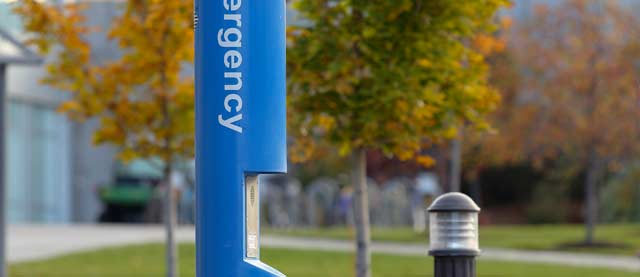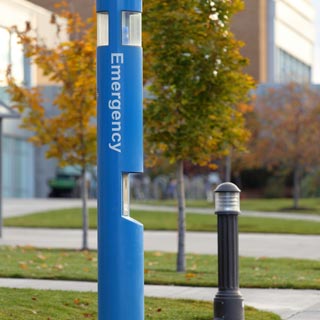Possessing common sense and listening to your gut are going to be the biggest things that keep you safe on campus. Knowing to keep your dorm room locked when you’re not around and to protect your electronics with a password can help prevent theft and identity theft. Knowing to walk in a group and not to walk home under the influence can prevent any number of crimes. That said, accidents and emergencies do occur, and in those cases, campus police or emergency services will need to be called and you will need to know what to do until they arrive. Know when to evacuate and when to stay put, and subscribe to the emergency notification emails and texts at your college.
Most college campuses have their own security or police force that can be alerted of an emergency via phone or by pressing the button on an emergency box on campus. In a true emergency, though, campus security shouldn’t be your only call. Learn what constitutes a true emergency and how to handle a 9-1-1 call should a situation arise. Carry an in-case-of-emergency card on you and program emergency contact and emergency medical information into your phone so that emergency services knows who to contact if you’ve been affected.
You probably feel safe on your college campus, and for the most part, you should. Colleges aim to provide well-lit walkways and easy-to-follow paths between buildings. However, knowing how to walk safely, particularly at night, is a skill that every college student should know. Whenever possible, walk in a group or call for a walking companion (offered on many large campuses). Don’t put your safety on the line by walking home under the influence, and know to call 9-1-1 or campus security if you ever feel unsafe.
College students have many valuables: smartphones, smart watches, laptops, and tablets are all common on campus. Walking around with these types of electronics in plain sight can make you a target, as can leaving your belongings unattended, even just for the time it takes to buy a snack from a vending machine. Common sense will be your best option when it comes to preventing theft: keep your things in your sight, lock your door when you’re not in the room, keep your car and bike locked up, and try not to make yourself a target.
Students have been learning what to do in case of fire since elementary school where they were taught to “stop, drop, and roll.” But knowing what to do if you catch on fire is a little bit different from knowing how to prevent the fire from starting in the first place or from how to put one out. Simple things like unplugging unused appliances, not hanging curtains over a radiator, and never leaving a lit candle unattended can prevent many fires. If one does start, though, the method for putting it out depends on the type of fire it is. Learn the differences and always call emergency services.
Unfortunately, mass shootings on college campuses have been happening since the 1966 attack at the University of Texas at Austin. While the chances of your involvement in a school shooting aren’t astronomically high, you still need to know what to do if such an emergency arises. Campus will go into lockdown if there’s a threat, meaning that everyone should find a safe place to hide until the threat passes. Recovering from such a traumatic event is hard, but campuses will make sure that students get the mental health resources necessary to heal.
With so much classwork done on computers and online, students should be extra careful with their personal information. Most schools will require anyone on their network to have internet protection, and students should continue this habit beyond college as well, as it protects computers from viruses and spyware. Creative passwords will help protect email and social media memberships from hackers, but students should also be aware of unexpected email attachments and what personal information is publicly posted on social media accounts.
Bullying isn’t just something that students deal with as children. In college, bullying can range from name-calling to aggressive behavior and can adversely affect a student’s academics, self-esteem, and social life. Peer pressure is a common form of bullying found on college campuses, particularly in party settings where students are encouraged to drink or try drugs. Hazing is a similar form of bullying but often takes place within student organizations or sports teams. The answer to bullying is simple respect and the oft-told advice “treat others the way you want to be treated.”
Assault doesn’t have to end in violence, though it often does. In fact, the threat of an imminent physical attack is enough to be considered an assault. The perpetrator of assault can be of any gender, race, and age, as can the victim of assault. It can also come from someone who knows the victim or a complete stranger. If you have been the victim of assault, consider calling 9-1-1 and campus security so that they can try to find the perpetrator and provide necessary medical attention. Remember that your friends and family, as well as mental health professionals, are there to help you in your recovery.

















